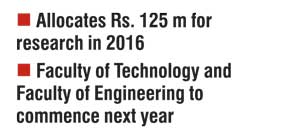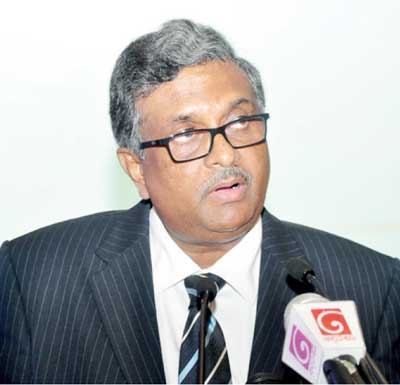Saturday Feb 28, 2026
Saturday Feb 28, 2026
Thursday, 17 December 2015 00:00 - - {{hitsCtrl.values.hits}}
 By Charumini de Silva
By Charumini de Silva
In an effort to take university research to the next level, the University of Sri Jayawardenepura has decided to set up a research school by 2017.
With the establishment of the Faculty of Technology and the Faculty of Engineering from next year, the university intends to set up a research school combining all its research centers from 2017.
It will be the first ever research school established in a national university in Sri Lanka.
Noting that research is a vital component in the journey towards national development, University of Sri Jayawardenepura Vice Chancellor Prof. Sampath Amaratunga said that they have decided to grant Rs. 125 million funds for research centers.
He said during this year the university has allocated Rs. 45 million worth of research funds to facilitate carefully selected research initiatives and hope to increase the grants for next year.
Prof. Amaratunge went on to say that this year the fund allocation for universities were based on the number of internal students and the University of Sri Jayawardenepura got the highest amount of fund allocations this year. The estimate fund allocation for next year is Rs. 1.18 billion.
Outlining his plans for 2016 the Vice Chancellor said apart from establishing the Faculty of Technology and the Faculty of Engineering they intend to create two more research centers on advance computer technology and brain and neuron science.
He said that they hope to enroll 350 students to the Faculty of Technology and 120 students for the Faculty of Engineering next year, while the administration had also recruited six new PhD holders as lectures to these two faculties.
Prof. Amaratunge further said that they also get assistance of visiting lectures from the Open University, University of Moratuwa, German Technical Training Institute and the University of Vocational Technology for the new faculties.
Highlighting the strong research base of University of Sri Jayawardenepura, he said that they have a spectrum of academic disciplines engaging in research at national and international level, and that they hope these sophisticated high end laboratories will be incorporated and provide access to all researchers of the university.
At present the university has seven research centers; cancer research, kidney research, water research, nano-technology research, dengue research, social science research and management research.
“As pioneers of management education and being a center of excellence in management studies, we have contributed in many dimensions especially in terms of research; we set the benchmark for conducting conferences promoting quality research,” he said.
Prof. Amaratunge pointed out that steps have taken to promote undergraduate research and postgraduate research to encourage innovations and new findings.
Emphasising on the importance of managerial issues with regard to academia as well as corporate and public-sector organisations, he asserted that strong and mutually beneficial links between academia and the business community is vital.
“I strongly believe that the findings of these research studies will be immensely beneficial to the business community. Academic and business communities should join hands by sharing their knowledge and expertise to encourage more quality research,” he explained.
He further said that they revamped the University Research Committee into a fully-fledged ‘Research Council’ and provided it with many resources and powers.
Under a series of activities planned by the Research Council, they recently launched the University Research Awards scheme and recognised the noble research efforts of our researchers, Prof. Amaratunge added.